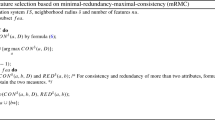Abstract
In data mining and knowledge discovery, evaluation functions for evaluating the quality of features have great influence on the outputs of feature selection algorithms. However, in the existing entropy-based feature selection algorithms from incomplete data, evaluation functions are often inadequately computed as a result of two drawbacks. One is that the existing evaluation functions have not taken into consideration the differences of discernibility abilities of features. The other is that in the feature selection algorithms of forward greedy search, if the feature with the same entropy value is not only one, the arbitrary selection may affect the classification performance. This paper introduces a new evaluation function to overcome the drawbacks. A main advantage of the proposed evaluation function is that the granularity of classification is considered in the evaluation computations for candidate features. Based on the new evaluation function, an entropy-based feature selection algorithm from incomplete data is developed. Experimental results show that the proposed evaluation function is more effective than the existing evaluation functions in terms of classification accuracy.
Access this chapter
Tax calculation will be finalised at checkout
Purchases are for personal use only
Preview
Unable to display preview. Download preview PDF.
Similar content being viewed by others
References
Kohavi, R., John, G.H.: Wrappers for feature subset selection. Artificial Intelligence 97, 273–324 (1997)
Qu, G., Hariri, S., Yousif, M.: A new dependency and correlation analysis for features. IEEE Transactions on Knowledge and Data Engineering 17(9), 1199–1207 (2005)
Liang, J., Yang, S., Winstanley, A.: Invariant optimal feature selection: A distance discriminant and feature ranking based solution. Pattern Recognition 41(5), 1429–1439 (2008)
Dash, M., Liu, H.: Feature selection for classification. Intelligent Data Analysis 1(3), 131–156 (1997)
Steppe, J.M., Bauer, K.W., Rogers, S.K.: Integrated feature and architecture selection. IEEE Transactions on Neural Networks 7(4), 1007–1014 (1996)
Pawlak, Z., Skowron, A.: Rough sets and Boolean reasoning. Information Sciences 177(1), 41–73 (2007)
Xue, B., Cervante, L., et al.: A multi-objective particle swarm optimisation for filter-based feature selection in classification problems. Connection Science 24(2-3), 91–116 (2012)
Cervante, L., Xue, B., Shang, L., Zhang, M.J.: Binary particle swarm optimisation and rough set theory for dimension reduction in classification. In: IEEE Congress on Evolutionary Computation (CEC), pp. 2428–2435 (2013)
Sebban, M., Nock, R.: A hybrid filter / wrapper approach of feature selection using information theory. Pattern Recognition 35(4), 835–846 (2002)
Farahat, A.K., Ghodsi, A., Kamel, M.S.: An efficient greedy method for unsupervised feature selection. In: The 11th IEEE International Conference on Data Mining (ICDM), pp. 161–170 (2011)
Hu, Q.-H., Zhao, H., Xie, Z.-X., Yu, D.-R.: Consistency based attribute reduction. In: Zhou, Z.-H., Li, H., Yang, Q. (eds.) PAKDD 2007. LNCS (LNAI), vol. 4426, pp. 96–107. Springer, Heidelberg (2007)
Sun, L., Xu, J.C., Tian, Y.: Feature selection using rough entropy-based uncertainty measures in incomplete decision systems. Knowledge-Based Systems 36, 206–216 (2012)
Qian, Y.H., Liang, J.Y., Pedrycz, W., Dang, C.Y.: An efficient accelerator for attribute reduction from incomplete data in rough set framework. Pattern Recognition 44, 1658–1670 (2011)
Slezak, D.: Approximate entropy reducts. Fundamenta Informaticae 53, 365–390 (2002)
Dai, J.H., Wang, W.T., Xu, Q.: An uncertainty measure for incomplete decision tables and its applications. IEEE Transactions on Cybernetics 43(4), 1277–1289 (2013)
UCI Machine Learning Repository, http://www.ics.uci.edu/mlearn/MLRepository.html
Author information
Authors and Affiliations
Editor information
Editors and Affiliations
Rights and permissions
Copyright information
© 2014 Springer International Publishing Switzerland
About this paper
Cite this paper
Shu, W., Shen, H., Sang, Y., Li, Y., Wu, J. (2014). A New Evaluation Function for Entropy-Based Feature Selection from Incomplete Data. In: Tseng, V.S., Ho, T.B., Zhou, ZH., Chen, A.L.P., Kao, HY. (eds) Advances in Knowledge Discovery and Data Mining. PAKDD 2014. Lecture Notes in Computer Science(), vol 8444. Springer, Cham. https://doi.org/10.1007/978-3-319-06605-9_9
Download citation
DOI: https://doi.org/10.1007/978-3-319-06605-9_9
Publisher Name: Springer, Cham
Print ISBN: 978-3-319-06604-2
Online ISBN: 978-3-319-06605-9
eBook Packages: Computer ScienceComputer Science (R0)




